Overview
The article titled "7 Key Differences You Need to Know About Debit vs Credit" addresses the essential distinctions between debit and credit instruments, highlighting their implications for financial management, security, and rewards. It emphasizes that debit cards enable users to avoid debt by restricting spending to available funds. In contrast, credit cards provide advantages such as rewards and the opportunity to build credit history. This means that choosing the right tool is crucial, depending on individual financial goals and habits.
Introduction
Navigating the financial landscape as a freelancer or small business owner can indeed be daunting, particularly when it comes to grasping the intricacies of debits and credits. These foundational accounting principles are not mere technical jargon; they are essential tools that enable individuals to maintain accurate financial records and make informed decisions.
With the emergence of digital solutions like Kulud, which streamline expense management and enhance financial oversight, mastering the balance between debits and credits has never been more critical.
This article explores the operational differences between debit and credit cards, their financial implications, security features, rewards, and their impact on credit scores. By equipping freelancers with the knowledge needed to optimize their financial strategies, we aim to foster business growth in an increasingly competitive environment.
Understanding Debits and Credits: The Basics
Debits and receipts form the cornerstone of accounting, essential for maintaining accurate financial records and grasping the nuances of debit versus credit. In this context, a debit (Dr) increases asset or expense accounts while decreasing liability or equity accounts, whereas a corresponding credit (Cr) performs the opposite function. This duality of debit and credit is vital for double-entry bookkeeping, a system that guarantees every financial transaction is recorded in two accounts, thus providing a comprehensive overview of an entity's financial health.
For independent workers and small business owners, understanding the distinction between debit and credit is not merely academic; it has a direct impact on financial oversight and management. In 2025, with fewer than half of adult cardholders (47%) carrying a balance for at least one month, the importance of mastering debits and charges becomes even more pronounced. This knowledge empowers individuals to make informed financial decisions, ultimately leading to improved cash flow management and strategic planning.
Real-world examples of double-entry bookkeeping demonstrate how these principles apply in practice. For instance, when an independent contractor receives payment for services rendered, they would record a debit to the cash account alongside an entry to the revenue account. This straightforward transaction illustrates the increase in assets and the corresponding growth in income, underscoring the balance that debits and credits maintain.
Furthermore, professional insights underscore the necessity of grasping these accounting fundamentals. Economic specialists assert that a solid understanding of debit versus credit can significantly enhance a freelancer's ability to engage effectively with accountants and advisors, streamlining processes and reducing the time spent on bookkeeping tasks.
As the landscape of money management evolves, particularly with the rise of digital solutions like Kulud, which automates expense management while ensuring data security through advanced encryption, the ability to navigate the complexities of debit and credit becomes increasingly essential. Kulud’s platform not only automates expense categorization but also enables users to analyze previous emails for receipts, simplifying financial processes further. User testimonials, such as that from Georgi Knyazhev, emphasize how Kulud saves time and enhances communication with accountants.
Additionally, with instant credit transfers comprising 15% of total credit transfer transactions processed by euro area retail payment systems, the relevance of these concepts is heightened. The shift towards digital solutions, bolstered by Kulud's affordability, highlights the necessity of mastering accounting basics. By understanding these concepts, independent workers and small business owners can harness technology like Kulud to simplify their accounting processes, allowing them to concentrate on growth and innovation in their businesses.
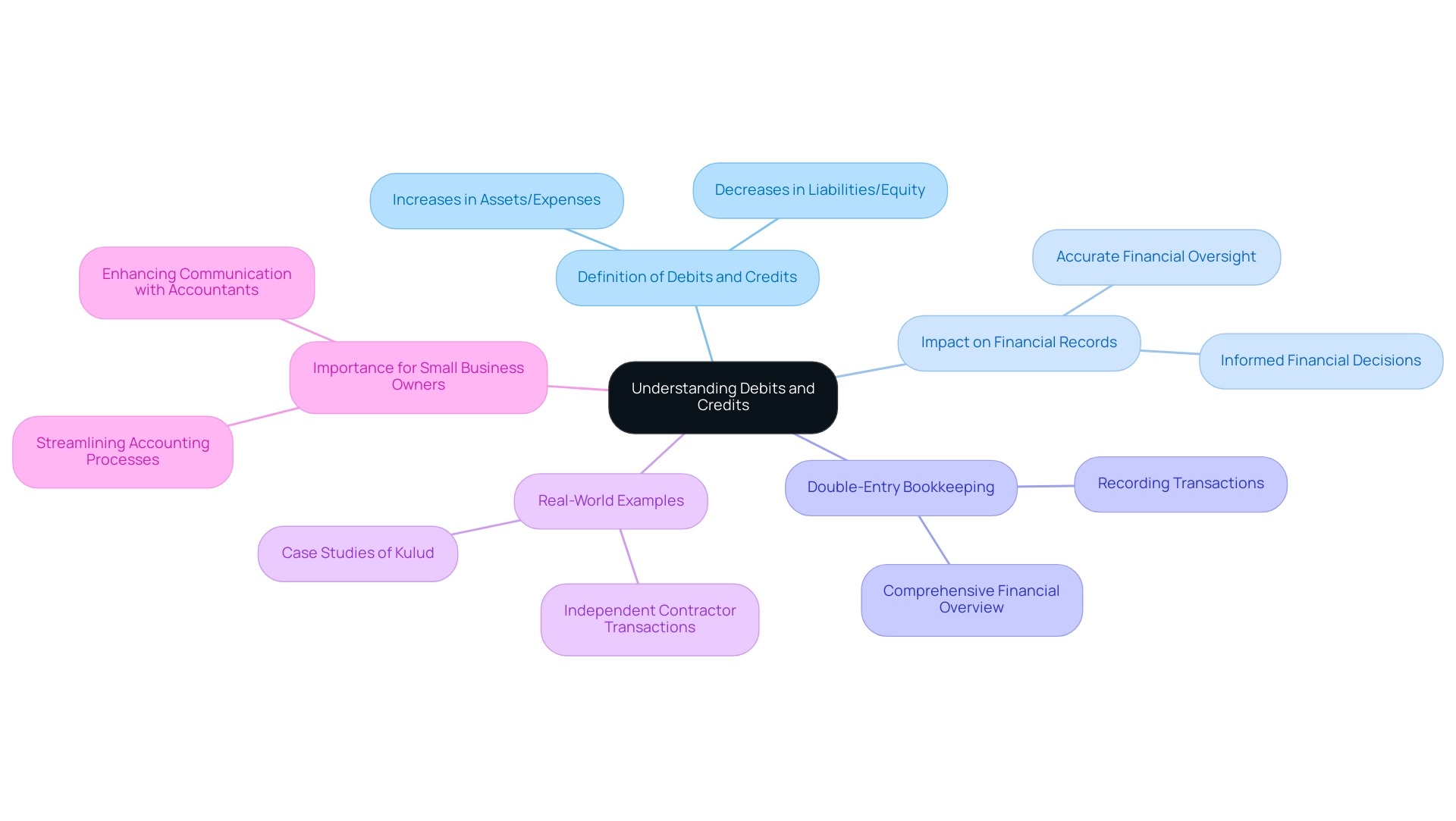
Operational Differences: How Debit and Credit Cards Work
Debit instruments operate by withdrawing funds directly from your bank account, ensuring that you only spend what you have. This is particularly beneficial for freelancers, as it fosters a disciplined approach to financial management and helps prevent overspending. In contrast, charge accounts offer the flexibility to borrow up to a predetermined limit, allowing for purchases that can be repaid later, often with interest.
Understanding this operational difference is crucial for freelancers who need to navigate cash flow effectively.
In 2025, statistics reveal that a significant number of freelancers utilize both debit and charge methods to manage their finances. Approximately 85% of consumers possess a debit card, making an average of 35 transactions per month, highlighting the popularity of debit options among budget-conscious individuals. Concurrently, charge cards remain a staple for many, with total Canadian debt from these instruments nearing $120 billion, underscoring the reliance on borrowing for urgent financial needs.
Notably, 40% of American small enterprises hold over $100,000 in unpaid debt, illustrating the financial challenges independent workers face.
Recognizing when to use each type of account, particularly in the context of debit versus credit, is vital for financial stability. For instance, employing a debit account for daily expenses can help independent workers maintain a balanced budget, while charge cards can be strategically utilized for larger purchases or emergencies, provided they are settled promptly to avoid interest fees. Virginia C. McGuire notes, 'Charge accounts are convenient and safe; they assist in establishing a financial history, simplify budgeting, and generate benefits.'
Professional guidance encourages independent workers to routinely assess their cash flow and spending patterns to find the optimal balance of debit and credit usage.
Moreover, Kulud’s automated expense management platform can assist independent professionals in managing their expenses efficiently. With features such as automated receipt capture, bank transaction matching, and advanced encryption for data security, Kulud streamlines the expense management process, ensuring independent contractors stay informed about their financial health. The platform has successfully undergone a comprehensive Cloud Application Security Assessment (CASA) by Google, affirming its commitment to data privacy.
Additionally, users can effortlessly export data for VAT or annual reports, enhancing the platform's utility in accounting. Case studies indicate that independent workers who effectively manage their cash flow with both payment methods report improved financial well-being. The case study titled 'Debit Usage Trends' highlights that a significant portion of debit users cite budget control as their primary reason for use, reinforcing the trend toward financial discipline.
By utilizing debit and credit instruments for everyday expenses and significant, anticipated costs, independent workers can maintain better oversight of their finances, ensuring they have the necessary resources available when needed. This balanced approach not only aids in cash flow management but also enhances overall financial discipline, enabling freelancers to focus on growing their businesses without the burden of excessive debt. With global online sales projected to reach $8.3 trillion by 2025, the importance of digital payment methods and efficient expense management solutions like Kulud, developed by leading founders and tech professionals, cannot be overstated.
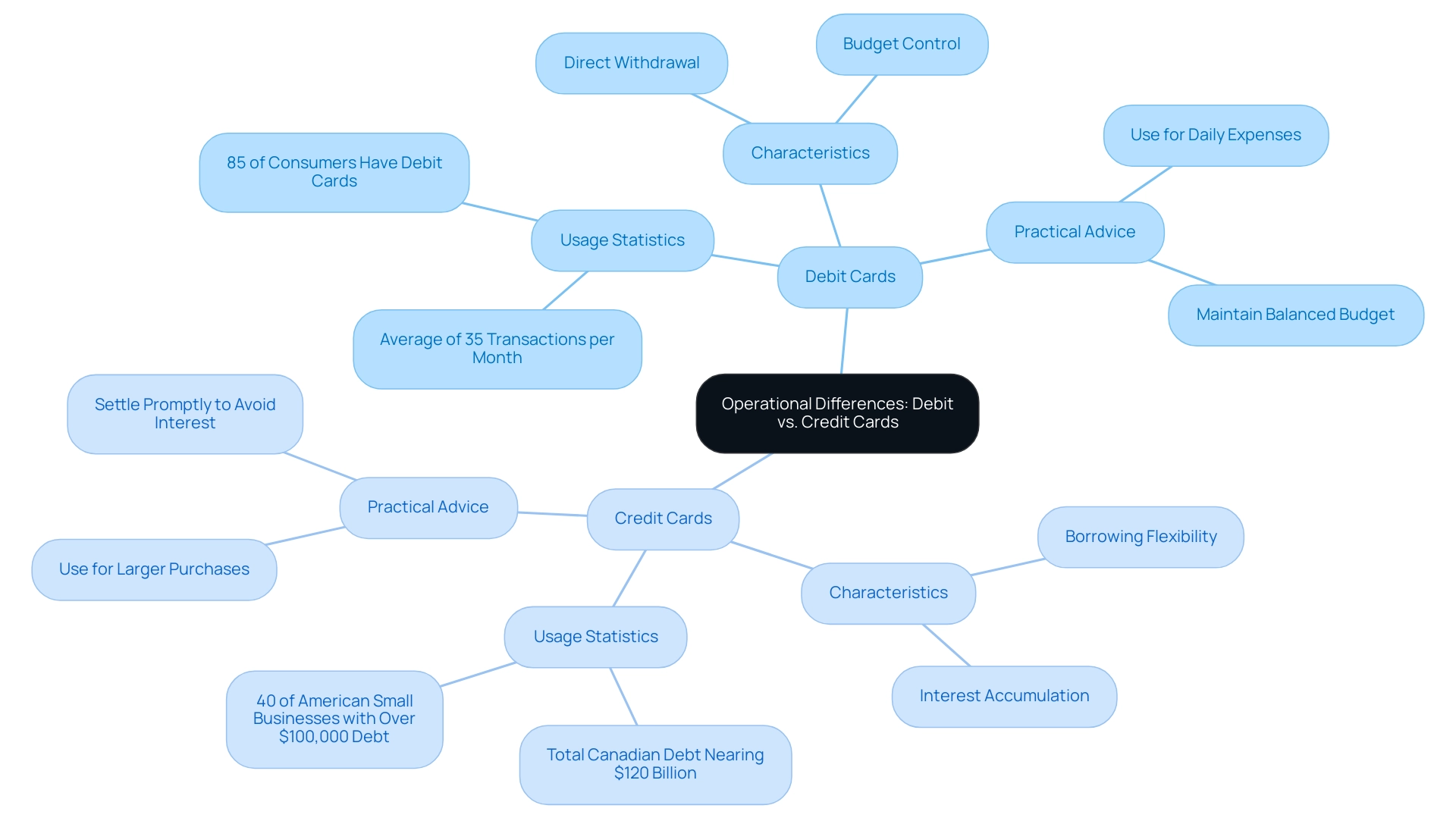
Financial Implications: Spending Limits and Interest Rates
Debit instruments provide a straightforward method for spending, as your limit is directly linked to your account balance. This feature inherently helps users avoid accumulating debt. In contrast, charge accounts come with predetermined spending limits established by the issuer, which, if not carefully managed, can lead to significant high-interest debt.
In 2025, the typical loan interest rate is around 21.3%. For freelancers, being aware of these rates is essential to avoid entering a debt cycle, especially when using payment methods for business-related expenses.
Furthermore, the monetary consequences of utilizing debit versus credit options extend beyond merely spending limits. While debit instruments can provide a sense of security by limiting spending to available funds, charge accounts can offer benefits such as rewards and enhanced cash flow management. However, the risk of accruing interest on unpaid balances can quickly outweigh these advantages if not handled judiciously.
As Greg Finn, Director of FP&A, notes, "The practice managers love Ramp; it allows them to keep some agency for paying practice expenses. They like that they can instantaneously attach receipts at the time of transaction, and that they can text back-and-forth with the automated system."
With Kulud's automated expense management solution, freelancers can effectively manage their activities by capturing invoices and receipts, selecting date ranges, and matching transactions with their bank accounts. Users can log in with their business email, add all their accounts, and even turn on automatic search for transactions, streamlining the process. This automated process not only simplifies bookkeeping but also aids in avoiding debt by ensuring that spending aligns with actual account balances.
Freelancers can easily export data for VAT or annual reports, providing a seamless connection to their accounting software and facilitating easy sharing with accountants.
Moreover, freelancers can gain from understanding the current average loan interest rates, which are crucial for making informed monetary choices. In 2025, the average rates indicate a broader trend that highlights the significance of strategic monetary planning. By choosing debit options, many self-employed individuals successfully evade debt, underscoring the advantages of debit versus credit, and utilizing their purchasing ability without the drawbacks linked to loans.
Statistics suggest that spending thresholds for independent workers to consider in 2025 are important when evaluating debit versus credit accounts as they maneuver through their economic environment. Additionally, the current delinquency rate of 3.08% highlights the importance of managing credit card usage effectively. Comprehending these dynamics can empower independent workers to make choices that align with their financial goals, ensuring they maintain control over their expenses while fostering business growth.
The case study on the Kulud Expense Management Platform illustrates how freelancers can effectively manage their finances and avoid debt through automation, further emphasizing the need for strategic expense management.
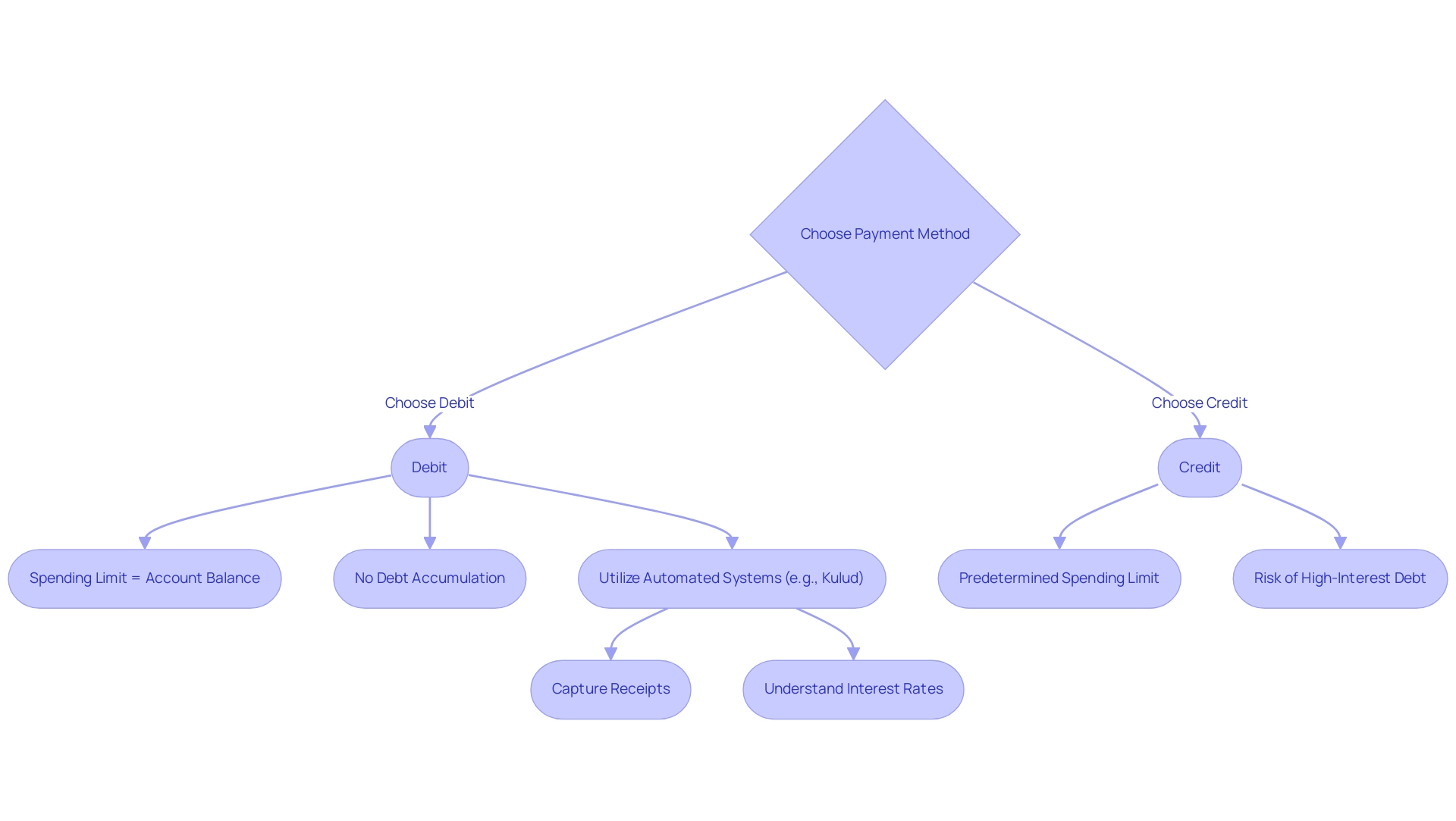
Security Features: Protecting Your Finances
Freelancers often have common concerns regarding expense management, particularly when it comes to the security features of debit versus credit instruments. While both types of instruments incorporate security measures, they differ significantly in fraud protection. Credit instruments generally offer superior fraud protection, including zero liability for unauthorized transactions, meaning users are not held responsible for charges they did not authorize. This is especially advantageous for freelancers who frequently engage in online transactions, where the risk of fraud is heightened.
For example, Georgia Knyazhev noted, "Kulud has transformed my accounting processes, allowing me to save time and streamline communication with my accountants," which highlights the effectiveness of automated expense management tools like Kulud.
In contrast, debit instruments withdraw funds directly from the user's bank account, which can expose them to greater risk if their information is compromised. Although security protocols for debit accounts have improved, leading to a reduction in fraud rates, they still do not match the extensive safeguards provided by credit accounts. For instance, 65% of organizations reported fraud attempts targeting checks, making them the most fraud-prone payment method. This underscores the importance of robust security features across all payment methods.
Current trends indicate that while security features are advancing in both debit and credit options, charge methods remain the preferred choice for many independent professionals when it comes to online transactions. Notably, the median fee of a fraudulent transaction has risen to $79, reflecting a 27% increase from the previous year. This statistic serves as a reminder for independent workers to stay vigilant and evaluate the enhanced protection offered by various payment methods.
Real-world examples further illustrate the effectiveness of fraud protection in payment methods. Independent workers utilizing these methods can benefit from features such as transaction notifications and the ability to temporarily disable their accounts immediately if unusual activity is detected. These proactive measures are essential for safeguarding their finances.
Moreover, with 77% of BEC attacks using spoofed emails to deceive recipients, independent workers must be aware of the broader context of online security risks they face. This reinforces the necessity for robust fraud protection measures and reliable expense management solutions like Kulud, which ensures data security through advanced encryption, as validated by a comprehensive Cloud Application Security Assessment (CASA) conducted by Google and the App Defense Alliance (ADA).
In summary, while both debit and credit alternatives offer security features, credit options typically provide a greater level of fraud protection, making them a more secure choice for independent workers navigating the complexities of online transactions. With Kulud's automated expense management solution, users can trust that their data is secure and their financial processes are simplified.
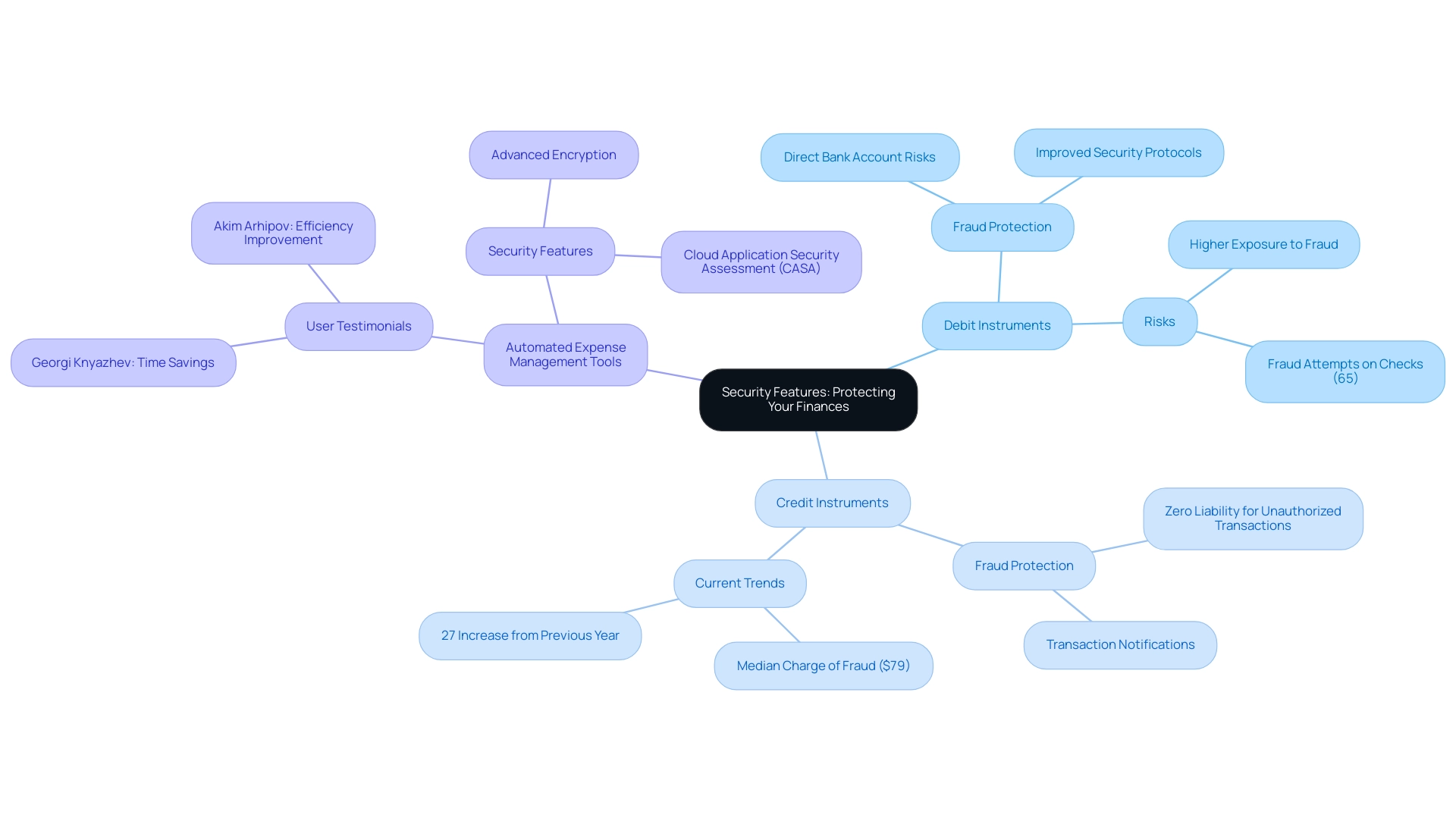
Rewards and Benefits: Credit Cards vs. Debit Cards
Credit accounts often include rewards programs that offer cashback, travel points, or other incentives for every dollar spent, making them an appealing choice for freelancers and small business owners. In contrast, when considering debit versus credit, debit instruments generally lack such rewards, which can limit potential savings. For instance, recent statistics indicate that more than half of Gen Z consumers utilize between 20 to 60% of their available funds monthly, highlighting a growing trend towards leveraging resources for everyday expenses.
Using a payment method for business expenses can provide significant advantages, such as the gathering of rewards that can be reinvested into the business. However, it is crucial for users to manage their payments diligently, particularly when considering debit versus credit, to avoid interest charges, which can negate the advantages of the rewards earned. Financial consultants highlight that small business proprietors can optimize the advantages of payment methods by strategically choosing options with beneficial rewards schemes, especially when evaluating debit versus credit based on their spending patterns.
Furthermore, the current delinquency rate is near historic lows, suggesting a safer environment for credit card usage. Moreover, with Kulud’s automated expense management solution, independent workers can effortlessly capture invoices and receipts, match them with bank transactions, and streamline their accounting processes.
This integration enables users to concentrate on expanding their business while ensuring all monetary data is accurately processed and securely managed. Kulud can also automatically identify emails containing receipts and analyze previous emails for receipt information, saving users time and enhancing their financial management. Case studies reveal that brands are adapting their loyalty programs to meet evolving consumer preferences, suggesting that independent professionals can benefit from personalized rewards that align with their unique business needs.
As Daniel Bednar, Chief Strategy Officer at OceanAir Federal Credit Union, observes, there is significant demand for financial products among members, motivated by inflation worries and desires for rewards. This trend highlights the present importance of understanding charge options in terms of debit versus credit for independent workers and small business proprietors. As the rewards program environment changes, independent workers are encouraged to investigate payment options that provide competitive benefits while utilizing tools like Kulud to maximize every dollar spent and uphold sound monetary practices.
Georgi Knyazhev states, 'Kulud has transformed my accounting processes, allowing me to save time and streamline communication with my accountants,' illustrating the impact of effective financial management tools in navigating these opportunities.
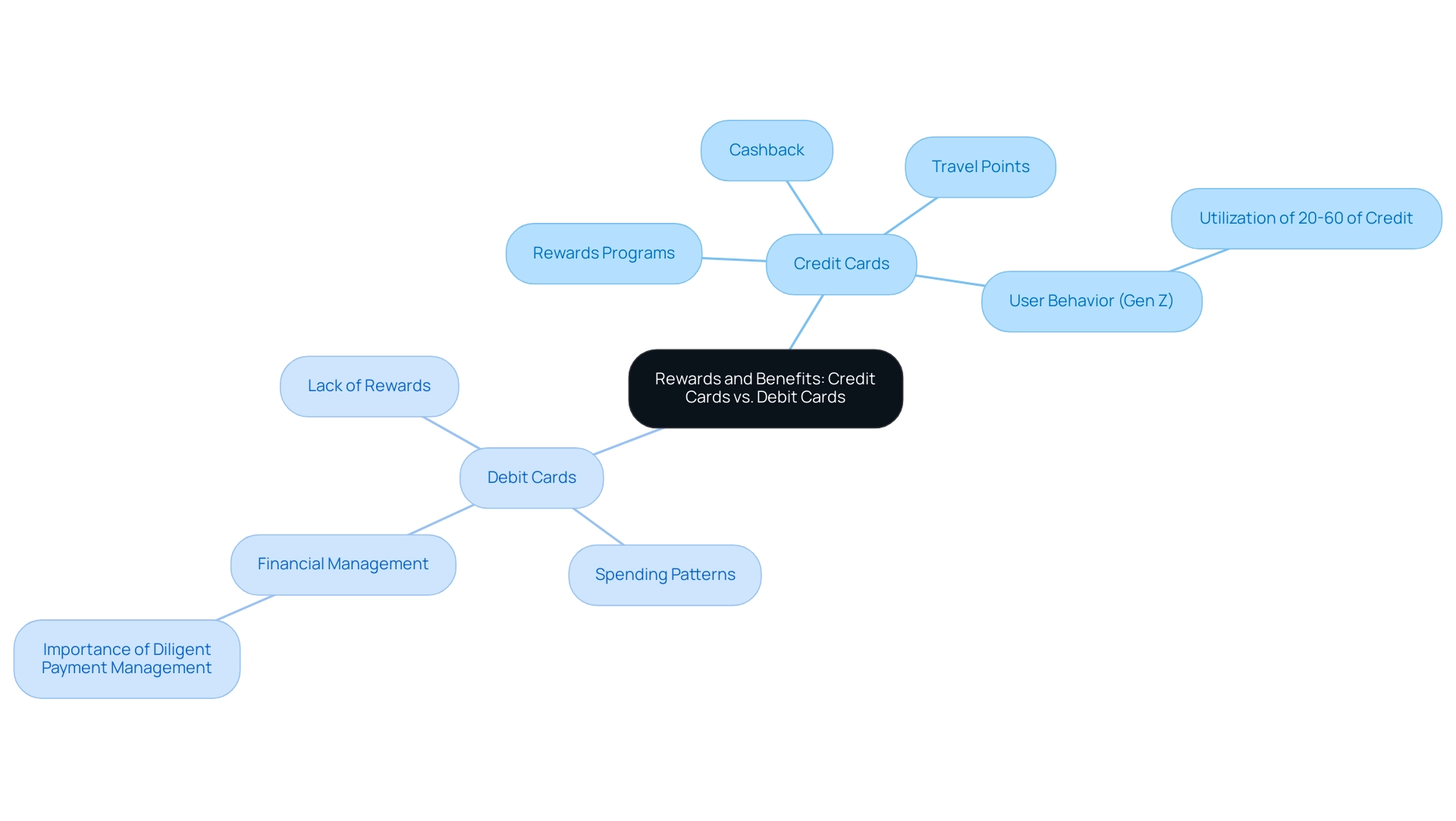
Impact on Credit Scores: Understanding Your Financial Health
Utilizing a payment method wisely is essential for independent workers seeking to enhance their credit score, which plays a significant role in obtaining loans and securing favorable interest rates. Unlike charge accounts, the distinction between debit and credit usage does not influence your score since it does not involve borrowing funds. For freelancers, maintaining a good score is vital, as it can unlock better financing options for their businesses.
In 2025, statistics reveal that fewer than half of adult holders of revolving accounts (47%) maintained a balance on an account for at least one month in the past year, indicating a trend towards responsible management of borrowing. Furthermore, the median revolving balance for businesses that did not settle their bills in full each month is $7,000, highlighting the significance of timely payments in sustaining a healthy financial profile.
Expert views indicate that responsible use of charge accounts not only helps in establishing a reputation but also enhances monetary flexibility for small business proprietors. Becky Pokora, a Rewards Expert, emphasizes that 'using cards wisely can result in improved scores and greater opportunities for independent workers.' By making timely payments and maintaining low usage of available funds, independent workers can greatly enhance their scores, opening the door to improved economic opportunities.
In this context, Kulud enables users to focus on business development while keeping precise monetary records, which is crucial for effective loan management. Kulud's automated expense management solutions simplify the tracking of expenses, allowing for automated categorization of receipts and the ability to export reports in PDF format. This proactive strategy for financial management is crucial for independent workers aiming to expand their businesses and obtain necessary funding, all while benefiting from Kulud's commitment to data protection, as demonstrated by its successful completion of security evaluations such as the Cloud Application Security Assessment (CASA) and validation by the App Defense Alliance (ADA).
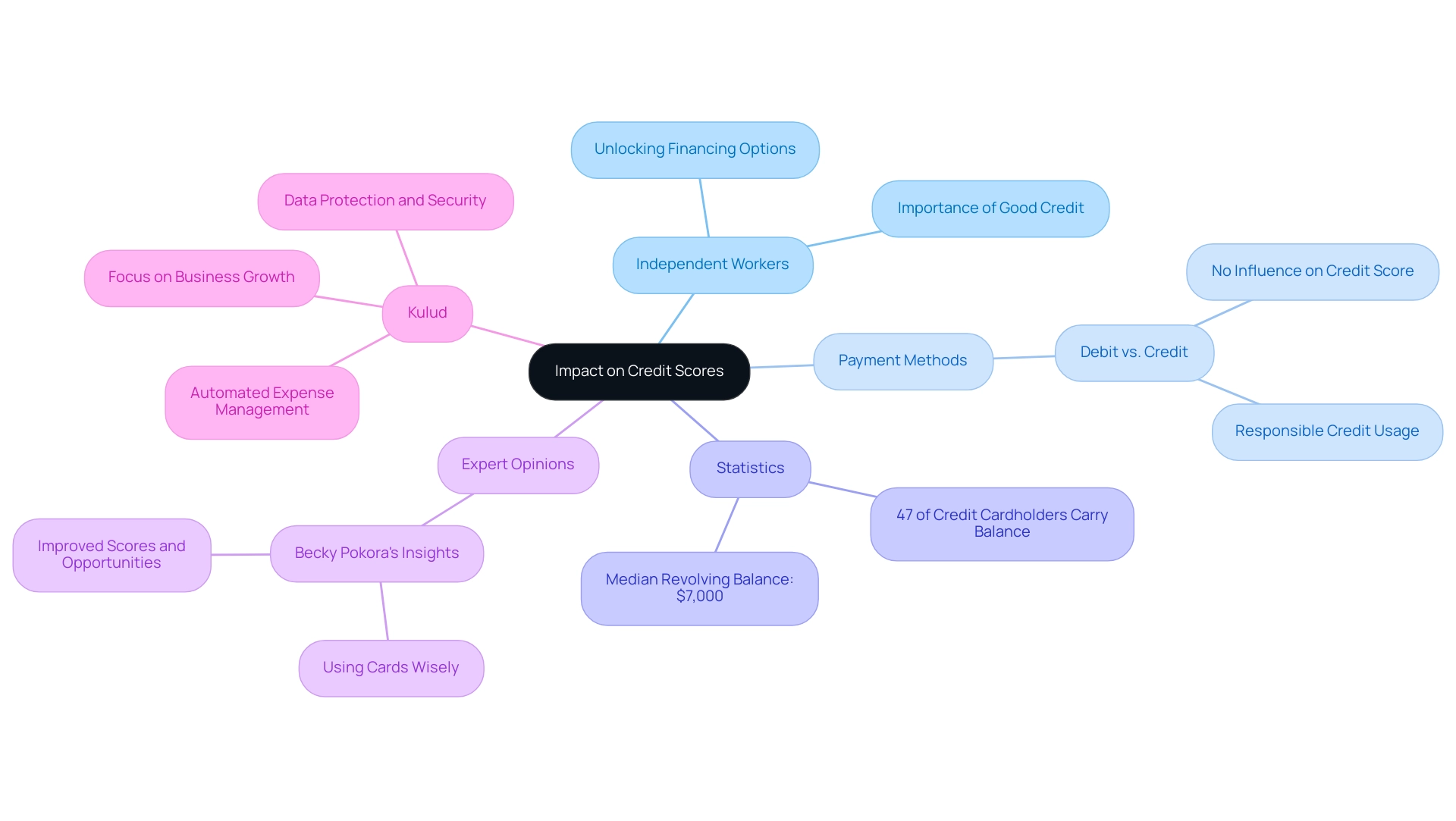
Key Takeaways: Making the Right Choice Between Debit and Credit
When selecting between debit and credit options, freelancers must thoroughly assess their spending habits, financial goals, and the importance of security. Debit instruments are particularly beneficial for those aiming to avoid debt and maintain strict control over their expenditures, allowing users to spend only what they possess. This makes them a practical choice for managing day-to-day expenses without the risk of overspending.
On the other hand, credit cards can provide valuable rewards and contribute to building a positive credit history when used judiciously. This can be beneficial for independent workers seeking to secure loans or financing for their businesses in the future. In fact, almost 47% of independent gig workers convey satisfaction with their working hours, reflecting a rising trend towards economic independence and adaptability in managing resources, as noted by I. Mitic.
Understanding the distinctions between debit and credit is essential for self-employed individuals and small business owners, as it enables them to make informed monetary decisions that align with their unique business requirements. Tools like Kulud can further enhance this process by automating the search for invoices and matching them with bank transactions, thus simplifying expense management. For example, establishing clear monetary objectives—such as saving for equipment or managing cash flow—can direct the choice in the debate of debit versus credit alternatives, while Kulud ensures that all monetary documents are effortlessly extracted and categorized.
Moreover, Kulud provides functionalities like exporting for VAT or annual reports, simplifying the process for independent workers to manage their tax responsibilities. Statistics show that two-thirds of CFOs are investing in cloud-based solutions and utilizing AI for improved decision-making, highlighting the significance of embracing contemporary tools that can assist independent workers in managing their expenses efficiently. Kulud's advanced features not only simplify this process but also offer independent workers a thorough overview of their business expenses and subscriptions, making money management less intimidating.
Furthermore, the influence of spending habits on the decision regarding debit versus credit cards cannot be overstated. As the freelance platform market is expected to expand to $8.39 billion by 2025, comprehending how to maneuver these monetary tools will be crucial for self-employed individuals seeking to succeed in a competitive environment. A considerable proportion of independent gig workers express satisfaction with their working conditions, with nearly 60% regarding their jobs as flexible, emphasizing the advantages of resources that support their lifestyle.
Expert advice suggests that independent workers should assess their financial behavior and goals before making a decision, ensuring that their choice, supported by tools like Kulud, aligns with their long-term success. Furthermore, the advanced encryption and security audits that Kulud employs ensure that freelancers' data remains secure and private, building trust in the platform. The ability to invite and collaborate with accountants or colleagues also enhances Kulud's appeal as a collaborative tool, making it a comprehensive solution for managing finances.
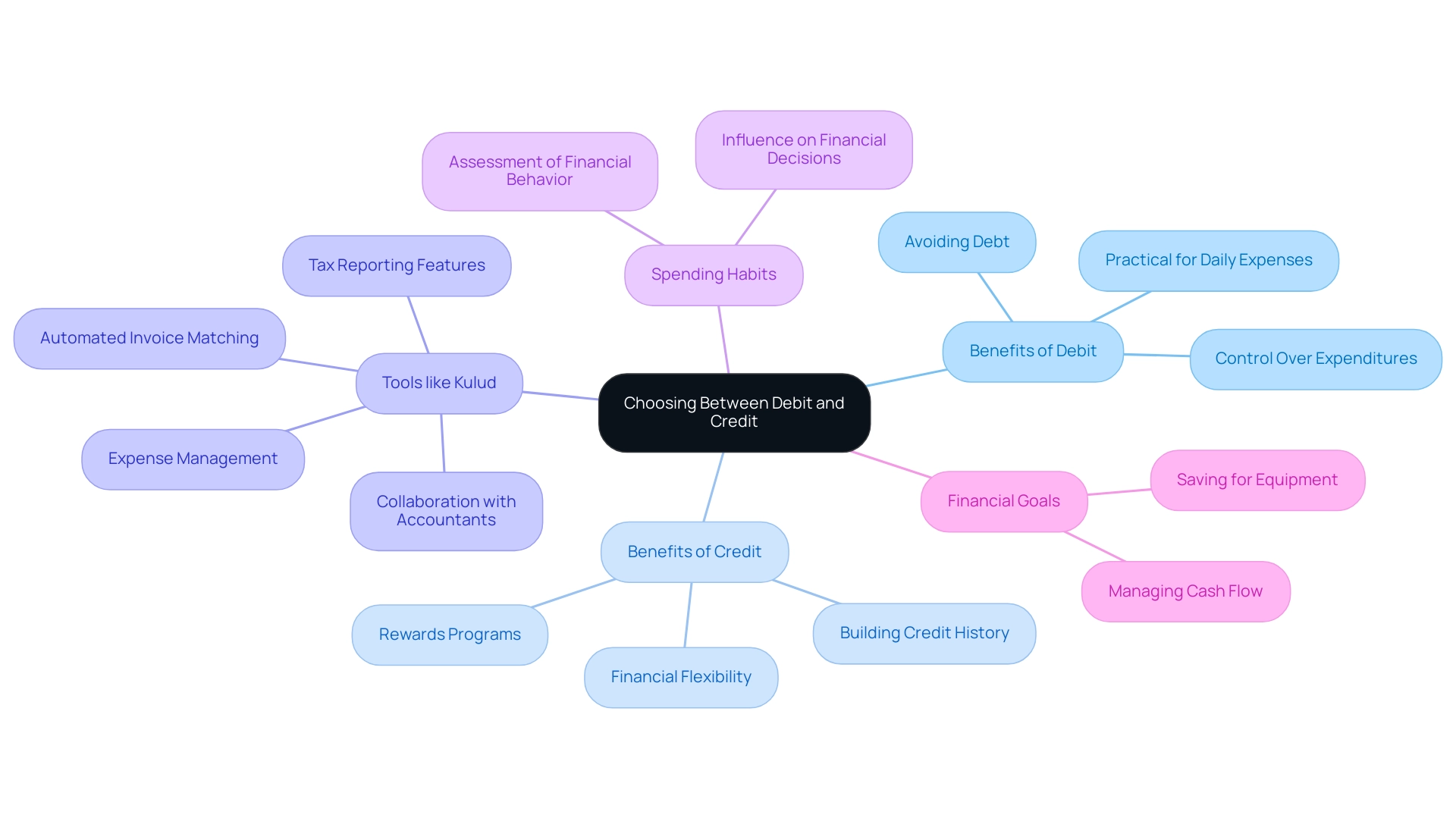
Conclusion
Understanding the nuances of debits and credits is crucial for freelancers and small business owners who seek to navigate their financial landscape effectively. By grasping these foundational accounting principles, individuals can maintain accurate records, make informed financial decisions, and ultimately foster business growth. The operational differences between debit and credit cards further emphasize the importance of strategic financial management—debit cards promote disciplined spending, while credit cards provide opportunities for rewards and credit building, if used responsibly.
The financial implications of card usage, including spending limits and interest rates, highlight the need for careful planning. While debit cards help avoid debt, credit cards can enhance cash flow management and offer valuable benefits when managed wisely. Security features also play a vital role in protecting finances, with credit cards typically providing superior fraud protection, a key consideration for freelancers who often conduct transactions online.
Moreover, the potential rewards associated with credit cards can significantly benefit freelancers when integrated with effective expense management solutions like Kulud. This platform not only simplifies bookkeeping but also enhances financial oversight, allowing users to focus on growth without being bogged down by administrative burdens. As the freelance economy continues to expand, understanding how to leverage these financial tools—while prioritizing security and strategic planning—will be essential for long-term success.
In conclusion, the choice between debit and credit cards should align with individual financial goals and habits. By utilizing modern solutions like Kulud, freelancers can streamline their financial management processes, ensuring that their decisions support both immediate needs and future aspirations. Embracing the balance between these financial tools will empower freelancers to thrive in an increasingly competitive environment.



